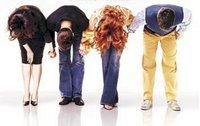Goodbye, Anastasia
 Will & Grace ends its eight-year run tonight, so it's time to bid farewell to Anastasia Beaverhausen. But will she and Jack, that lawyer and the decorator really be missed all that much? Critics disagree about the impact, whether the show leaves a big mark and changed attitudes because of its depiction of gays, or that it will be a quickly-forgotten relic of dated pop-culture jokes that won't hold up.
Will & Grace ends its eight-year run tonight, so it's time to bid farewell to Anastasia Beaverhausen. But will she and Jack, that lawyer and the decorator really be missed all that much? Critics disagree about the impact, whether the show leaves a big mark and changed attitudes because of its depiction of gays, or that it will be a quickly-forgotten relic of dated pop-culture jokes that won't hold up.The disagreements seem to be a referendum on whether it is more important for a sitcom to be funny or to be a form of media where sensitive topics can be addressed and made fun of:
"We're proud of what's transpired" in terms of presenting gay characters as real people, Kohan says. "But if our goal here had been to put out ideas or role models, the show would have failed. All you really care about is: Do you like these characters? Do you care about their relationships? Do they make you laugh?"And as with most sitcoms, the way to make you laugh is to play up the cliches and the catchphrases and same tired storylines. You end up with characters who are "so selfish and hateful to one another, you could never understand why they were friends to begin with. No amount of back story or riffs on low self-esteem could explain that."
The roles of Will Truman and Grace Adler became derivative characatures of other successful sitcoms, taking on some of the selfish tendencies of the Seinfeld quartet and the neuroses and compulsions of the Friends. And that's why I agree with the assessment that "it's hard to sustain characters over the long haul when nothing's at stake, and in its later years the show has bounced between silly and tiresome."
That's why I have to take exception with the arguments that the show was "a pioneer for using humor to address one of America's most incendiary issues...mainstream[ing] a way to laugh about gay, lesbian, bisexual, and straight sexual politics from a place of pure affection, not fear and hatred." I don't think the show hurt the case for gay rights, but I'm also not sure that it created "pure affection" for the gay rights or made a case for gay marriage. Backing me up is Beaverhausen fave Hank Steuver who writes:
The gayest among us now profess to have shirked duty and stopped watching a couple of seasons ago.
...For years, some viewers held on to the idea that the show was an example of pure progress in the way American culture views homosexuals. This turned out to be "Will & Grace's" burden to bear, and it discarded it happily.
...Watching the show...shoulder-to-shoulder with young men who had Ricky Martin haircuts and wore Abercrombie T-shirts, it was possible to make the mistake of reading "Will & Grace" as a solid triumph.
I would say that time would have to pass in order to tell if Will & Grace affects future generations in a way to I Love Lucy or All in the Family did. But I think that with constant reruns on Lifetime, we're likely to be able to tell far, far sooner whether Will & Grace can match the impact of that other long-running NBC sitcom about four individuals with a not-so-stealthy gay sensibility.


<< Home